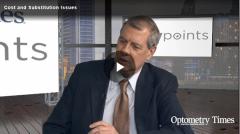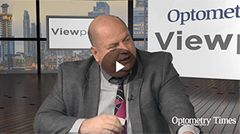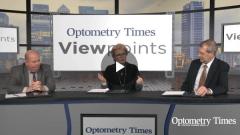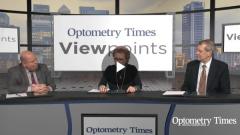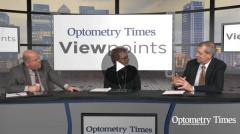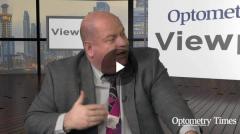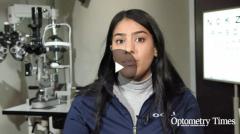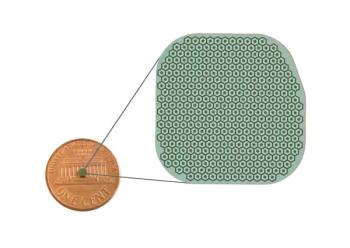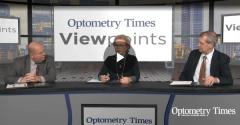
Role of the Technician
Episodes in this series

Experts discuss the value of utilizing technicians to screen for dry eye disease and the importance of educating all office staff who interact with patients about dry eye disease.
[Transcript]
Marguerite McDonald, MD, FACS: Let’s talk about the role of the technician in a dry eye practice. What do you think the technician should do in the dry eye practice as far as screening and counseling? Do you rely on your technicians, Rich?
Richard Mangan, OD, FAAO: I do. I have to say I was pretty spoiled for many years. I started my dry eye practice in 2006 when I carved out some dedicated time simply for this condition. I had the same technician ultimately for about 10 years, and it got to a point where she knew what I was going to say before I knew what I was going to say. It made the clinic very efficient, and it got to a point where she was even doing blood draws for me for serum tears. So, technicians can be very helpful. They can be vital to not only caring for the patient but in making you efficient. The one thing I hear from my colleagues about where they struggle with dry eye management is they feel that it bogs down their clinic. There are ways that you can really make it fun, make it efficient too, and still care for patients, and technicians are a big part of that.
Marguerite McDonald, MD, FACS: I find that you can have the technician do a lot, but some of the most critical stuff should come from the doctor’s mouth, and then you can transfer the rest of the learning experience to the technician. As far as technicians handling pharmacy requests to substitute for brand name products, Eric mentioned that with a specialty pharmacy like Orphan [Pharmacy Services], they’ve already interviewed you, they know what you consider to be a reasonable substitute. Do you do that, too, Rich?
Richard Mangan, OD, FAAO: Do I let my technicians substitute?
Marguerite McDonald, MD, FACS: Do you let them substitute without talking to you because you’ve given them a list of what you will allow for substitution? Do you have that?
Richard Mangan, OD, FAAO: If I document in the medical record that if this gets denied, it’s okay to do that, then yes.
Marguerite McDonald, MD, FACS: How do you keep your technicians up to date on the latest developments in pharmacology and the issues of generic and branded medications? Do you have team meetings?
Richard Mangan, OD, FAAO: Yes, but more so in my previous practice. Where I am at now, we’ll probably need to have more of those. It’s not only important, in my mind, to educate your immediate technicians, but even the individuals answering the phone. I’ve had patients come to me from a colleague’s practice because the receptionist was making recommendations about artificial tear products over the phone. So, the patient thought, well, maybe that’s all they can offer me. I’ll go to practice B and get an opinion.
The doctor in the practice she came from was an excellent doctor, and I know if he had the chance to do a real dry eye assessment, he would have. So, it’s important to let all of the staff know that this is a real disease. It’s been compared to disabling hip fractures and angina, as far as seriousness, and so it needs to be treated that way. The goal is to get patients in and give them the attention they need.
Eric Donnenfeld, MD, FACS: I think that the technician plays an extraordinarily important part in dry eye management. We empower our front office staff starting at the front desk. Patients fill out a questionnaire that looks at dry eye. If the patient checks off 2 positive comments for dry eye, it empowers my technicians who have been instructed by me that they can now do a dry eye work-up. That simplifies the dry eye management.
I don’t want to see patients and then send them out again for more testing once some tests were already done. I want them to be done when they first come in. Then they haven’t had medications put in their eye, and the tear film hasn’t been compromised in any way. So my technicians really play an important role. We empower them to allow us to manage dry eye more effectively.
A patient who’s positive, like Marguerite said, will get a tear film osmolarity test, a topography, and maybe a meibography as well. When the patient comes to me, I’m spending more time diagnosing the disease rather than ordering tests, and that lets me spend more time talking to them about therapy. I think if you are cognizant of the role that optometry, and front desk, and technicians can play, I think you can have a dry eye practice that’s extraordinarily effective, efficient, and seamless. And that’s where most doctors get caught up. They get bogged down. The patients are there for long periods. We can get our patients out very quickly with a rapid diagnosis that’s more accurate and therapeutic intervention that works more effectively.
Marguerite McDonald, MD, FACS: Yes. None of us wants to see our patients twice, see them, order more tests, go back in. And patients don’t like it either. They don’t like to be there a long time. Also, now with electronic medical records, everything is time stamped. Just as it is illegal to say everybody today gets a fluorescein angiogram, you have to have at least 1 check-off on the psychometric test for a symptom, or a well-known history of dry eye and you’re treating it and this is a follow-up, to go ahead with some of the testing. But it makes a big difference if they can go ahead [and have the testing] before you walk in.
Well, this has been fantastic. I really want to thank you, Dr Eric Donnenfeld and Dr Rich Mangan for your participation in this very insightful panel discussion. And thank you to our viewing audience for joining us during this Ophthalmology Times® and Optometry Times®presentation on branded vs. generics and the impact on ophthalmic medications. We hope you found this discussion to be useful in your clinical practice.
Newsletter
Want more insights like this? Subscribe to Optometry Times and get clinical pearls and practice tips delivered straight to your inbox.


